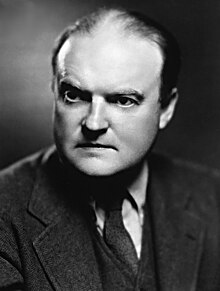Edmund Wilson
| Edmund Wilson | |
|---|---|
 |
|
| Born | Edmund Wilson May 8, 1895 Red Bank, New Jersey, U.S. |
| Died | June 12, 1972 (aged 77) Talcottville, New York, U.S. |
| Occupation | Literary critic, essayist, editor, journalist, writer |
| Nationality | American |
| Alma mater | Princeton University |
| Genre | Fiction, review of fiction |
| Notable works | Axel's Castle, To the Finland Station, Patriotic Gore |
| Spouse | Mary McCarthy (m. 1938–1946) |
Edmund Wilson (May 8, 1895 – June 12, 1972) was an American writer and critic who notably explored Freudian and Marxist themes. He influenced many American authors, including F. Scott Fitzgerald, whose unfinished work he edited for publication. His scheme for a Library of America series of national classic works came to fruition through the efforts of Jason Epstein after Wilson's death.
Wilson was born in Red Bank, New Jersey. His parents were Helen Mather (née Kimball) and Edmund Wilson, Sr., a lawyer who served as New Jersey Attorney General. Wilson attended The Hill School, a college preparatory boarding school in Pottstown, Pennsylvania, graduating in 1912. At Hill, Wilson served as the editor-in-chief of the school's literary magazine, The Record. From 1912 to 1916, he was educated at Princeton University. Wilson began his professional writing career as a reporter for the New York Sun, and served in the army with Base Hospital 36 from Detroit, Michigan, and later as a translator during the First World War. His family's summer home at Talcottville, New York, known as Edmund Wilson House, was listed on the National Register of Historic Places in 1973.
Wilson was the managing editor of Vanity Fair in 1920 and 1921, and later served as associate editor of The New Republic and as a book reviewer for The New Yorker and The New York Review of Books. His works influenced novelists Upton Sinclair, John Dos Passos, Sinclair Lewis, Floyd Dell, and Theodore Dreiser. He served on the Dewey Commission, that set out to fairly evaluate the charges that led to the exile of Leon Trotsky. He wrote plays, poems, and novels, but his greatest influence was literary criticism.
...
Wikipedia
